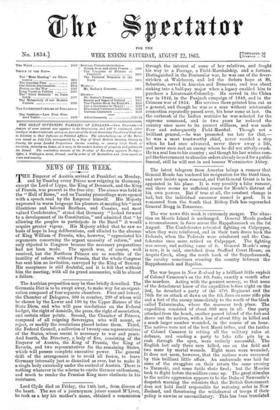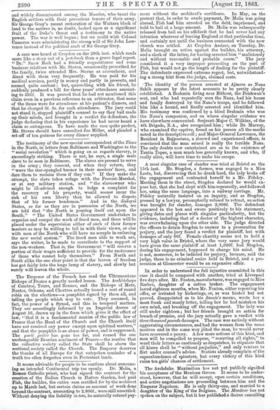The war began in New Zealand by a brilliant little
exploit of Colonel Cameron's on the 4th June, exactly a month after the murders. Acting with the greatest secrecy, so that none of the detachment knew of the expedition before night on the 3rd, he detached a party of the 57th Regiment and the 70th for an attack at dawn on the 4th June on some rifle pits and a fort of the enemy immediately to the south of the block called Tataraimaka, where the massacre took place. The expedition consisted of about 600 men in all. One party attacked from the beach, another passed inland of the fort and drove out the natives, with a loss of about fifty in killed and a much larger number wounded, in the course of an hour. The natives were not of the best Maori tribes, and the tactics of Colonel Cameron in setting all the military rules at defiance, and sending a party to take rifle pits by a. rush through the open, were entirely successful. The English lost only three men killed, one on the field and two more by mortal wounds. Eight more were wounded. It does not seem, however, that the natives were overawed by this brilliant little affair. An ambuscade was laid for some of the stragglers on their return the same evening to Taranaki, and some futile shots fired; but the Maoriea took to flight before the soldiers came up. The great stimulus to the native aggression appears to be the Duke of Newcastle's despatch warning the colonists that the British Government does not hold itself responsible for restoring order in New Zealand, and threatening the withdrawal of troops if their policy is unwise or unconciliatory. This has been translated and widely disseminated among the Maories, who taunt the English settlers with their precarious tenure of their army. Sir George Grey's recent restoration of the Waitara block of land to the natives is, no doubt, looked upon as a significant fruit of the Duke's threat and a testimony to the native power. The war is well begun ; but we could wish Colonel Cameron were administering the strong will of Sir John Law- rence instead, of the political craft of Sir George Grey.































